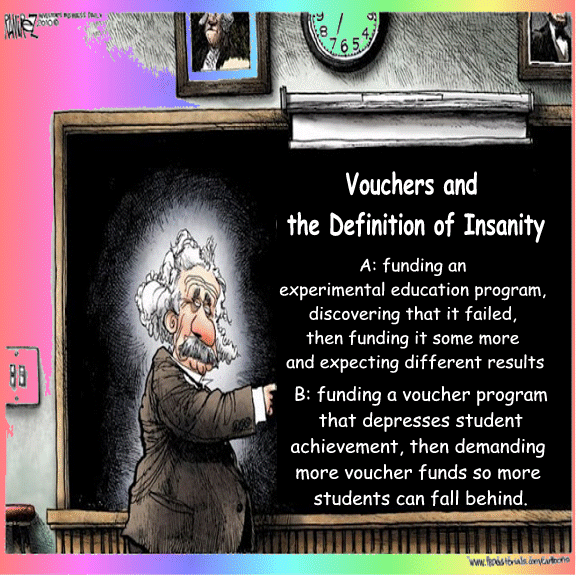Education Law Center: The Failure of Vouchers in Texas and of Voucher Expansion in Arizona | Diane Ravitch's blog
Education Law Center: The Failure of Vouchers in Texas and of Voucher Expansion in Arizona
It has not been a good year for vouchers. The research continues to show that they don’t “save poor kids from failing schools.” They are in fact more likely to cause their academic performance to decline.
Pastors for Texas Children has led the effort to block vouchers in Texas and SOS Arizona led the effort to block voucher expansion in Arizona.
Voucher advocates (Koch-funded) are coming back with new legislation for 2020, and Arizona SOS has pledged to beat them again.
There are heroes among us.
PRIVATE SCHOOL VOUCHERS: AN UNSUCCESSFUL EFFORT TO OVERTURN THE WILL OF VOTERS IN ARIZONA AND GROWING SUBURBAN OPPOSITION IN TEXAS
This is the third in our series, Private School Vouchers: Analysis of 2019 State Legislative Sessions. Read the first and second parts.
In 2017, the Arizona Legislature passed, and the Republican Governor, Doug Ducey, signed, a bill expanding the state’s existing Education Savings Account (ESA) voucher program. The legislation created one of the most expansive voucher programs in the nation, opening the existing ESA voucher, first established in 2011, to all students statewide. The program had been limited to students with disabilities, several Native American Tribes, and students in “low-performing” public schools.
Shortly after the bill’s passage, public school advocates collected more than 111,000 signatures to put an initiative on the ballot to overturn the ESA voucher expansion. In November 2018, Arizonans voted against the voucher expansionby an overwhelming margin: 65% to 35%. Following the vote, Beth Lewis, co-founder of Save our Schools Arizona, the grassroots group that led the effort to collect signatures, said, ”This result sends a message to the state and the nation that Arizona supports public education, not privatization schemes that hurt our children and our communities.”
However, just a few months after the public referendum, during the 2019 legislative session, Republican lawmakers introduced a number of bills to again expand the ESA voucher program. These bills would have added new student eligibility categories, including families below a certain income threshold and students who are victims of crimes or harassment. Two of these bills passed the relevant committees but were not considered by the full House or Senate. The remaining bills were not taken up at all.
While the proposed private school voucher bills did not pass in 2019, Arizona demonstrates that public school supporters can never assume their work is done, even when the public has resoundingly spoken against privatization. A day after the defeat of the expanded voucher program at the ballot box, voucher advocates publicly redoubled their efforts to expand the ESA program.
In Texas, where a Democrat has not been elected statewide since 1994, every bill introduced in the Legislature to establish a private school voucher program has failed to become law. As in several other conservative states, a bipartisan coalition of Democrats and rural Republican legislators in Texas has consistently opposed these bills. However, unlike many of these other states, more suburban Republican legislators are joining the opposition to vouchers, preferring to focus on funding for public schools.
In the 2018 election, Democrats picked up a number of seats in the suburbs of the state’s large cities, including those previously held by several strong voucher proponents. Additionally, during primary elections, several pro-voucher legislators lost to candidates who were more supportive of public education. As the head of the Texas American Federation of Teachers, Louis Malfaro, said, “….almost categorically the Republicans who ran as friends of public education prevailed over those who said we need more school choice, we need more vouchers, so I don’t see appetite on either side of the aisle.”
During the 2019 legislative session, Republican leaders, including the governor, notably did not include private school vouchers among their education priorities. Perhaps in response to electoral losses in the suburbs and a lack of support for vouchers, legislative leaders emphasized improving the state’s public school financing system instead.
Acknowledgements
Many thanks to Jason Unger for compiling the research and drafting this series on 2019 legislative sessions.
Press Contact:
Sharon Krengel
Policy and Outreach Director
Education Law Center
60 Park Place, Suite 300
Newark, NJ 07102
973-624-1815, ext. 24
Education Law Center: The Failure of Vouchers in Texas and of Voucher Expansion in Arizona | Diane Ravitch's blog








